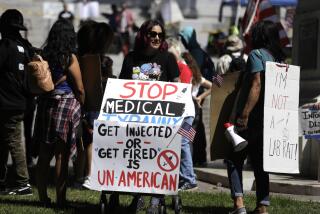FBI Returns to Md. Home in Anthrax Probe
- Share via
WASHINGTON — FBI agents conducted a second search of the Maryland home of a former Army scientist Thursday in connection with the investigation into the anthrax attacks that killed five people and sickened at least 13 others last fall.
Officials obtained a federal warrant authorizing the search of the apartment of Dr. Steven J. Hatfill, who worked as a bioweapon specialist at the U.S. Army Medical Research Institute of Infectious Diseases at Ft. Detrick, Md., from 1997 to 1999. Hatfill’s modest apartment is in Frederick, Md., just outside the sprawling Army complex and about 45 miles from the capital.
Hatfill, who has publicly declared his innocence, gave his consent to an initial search of his apartment in June.
But on Thursday, FBI agents returned after a judge approved their request to again search the premises.
FBI and Justice Department officials would not comment Thursday on why they wanted to return or what they found after spending several hours combing through the apartment and a nearby dumpster.
Authorities also declined to say whether Hatfill, 48, has become a suspect or is merely one of several dozen people who fit some general profile of a person who the FBI believes sent the deadly bacteria-laden letters. They stressed that he had not been taken into custody or even interviewed as agents searched his apartment.
“I think we are not going to characterize this guy in any way, shape or form,” said a senior FBI official Thursday evening, adding that the bureau was actively investigating several dozen people without classifying any of them as formal suspects. Many of them are scientists who work at Ft. Detrick and other government laboratories and universities where anthrax is studied, authorities said.
“We’re looking at a lot of different people. Someone could safely characterize any of those people as suspects, but I’m not sure we have anyone that we would hang that label [of prime suspect] on,” said the official, who spoke on the condition of anonymity. “We are doing a lot of investigating all over the place.”
Another FBI official, however, said the bureau has, within the last several days, become far more suspicious of Hatfill.
The investigation into the scientist “began as due diligence, but in pursuing all possibilities, it has now become more than that. There is a greater sense of urgency and anticipation.”
Recent searches and developments in the investigation into Hatfill have “created a lot of interest and a lot of activity and a lot [of] enthusiasm,” said the FBI official, who is privy to the scientific aspects of the investigation.
Hatfill was “in the area” during the search, according to the FBI official, who asked to remain anonymous. The official would not comment on neighbors’ reports that a car belonging to Hatfill had been towed away.
FBI officials say there is a tremendous amount of secrecy in the ongoing investigation, stressing that they do not want to unfairly smear anyone, including Hatfill, by simply searching their belongings and conducting other aspects of the wide-ranging investigation.
One agent cited the case of Richard Jewell, the Atlanta security guard whom the FBI quickly identified as the only suspect in the July 1996 bomb blast that killed one and injured 111 during the Atlanta Olympics. Jewell was cleared three months later and filed lawsuits against news outlets that reported the FBI claim; Atty. Gen. Janet Reno formally apologized to him the following year.
Asked about Hatfill at a news briefing, FBI Director Robert S. Mueller III had little to say.
“I can’t get into what is being undertaken in the course of the investigation, but I do believe we’re making progress,” he said.
Hatfill could not be reached for comment, and his lawyer, Thomas C. Carter, did not return calls, though he did tell a Baltimore TV station that Hatfill had done nothing wrong.
“He is one of many scientists who are undergoing the same scrutiny by the authorities, but for some reason, his name keeps popping up,” Carter told WJZ-TV in a telephone interview. “But he’s a patriot. He’s going to continue to cooperate in every way.”
The first anthrax-laden letters were sent last fall, initially targeting a tabloid newspaper office in Florida and, later, two senators in Washington and media outlets in New York.
Late last year, the FBI circulated a psychological profile of the suspected killer, saying that he was believed to be a male with a scientific background, with access to anthrax and with certain vaccinations designed to prevent infection from the spores.
Some Justice Department officials suggested Thursday that Hatfill fits that profile, at least in part. But in other respects, his career and personality seem at odds with the official profile.
For instance, the FBI profile describes the suspect as a “loner” who “lacks the personal skills necessary to confront others,” whereas Hatfill has been outspoken over the years about the threat posed by bioterrorism.
On Thursday, Mueller said the bureau still ascribes to the “lone wolf” theory.
Hatfill, who was born and raised in central Illinois, attended college in Kansas. In the late 1970s, after a brief marriage that ended in divorce, he traveled to Zimbabwe, then known as Rhodesia, to attend medical school.
In addition to a medical degree, Hatfill went on to earn other advanced degrees, including a doctorate in molecular cell biology. He lived and worked in South Africa and England and also served for 14 months as a medical officer and science team leader at an Antarctic research center.
After working on Ebola and other viruses at the infectious diseases institute until 1999, Hatfill took a job with Science Applications International Corp. He was at SAIC from January 1999 until March, company spokesman Ben Haddad said. Not long after starting work at SAIC, Hatfill and a colleague commissioned a private study into what would happen if powdered anthrax was sent through the mail, Haddad confirmed.
Hatfill began a new job July 1 as an associate director of Louisiana State University’s National Center for Biomedical Research and Training. The director there said that he had been assured by FBI officials last month that Hatfill was not a suspect in the anthrax probe.
In March, in a rare public comment on the case, Hatfill told the Baltimore Sun that the controversy has unfairly hurt him.
“I’ve been in this field for a number of years, working until 3 o’clock in the morning, trying to counter this type of weapon of mass destruction, and, sir, my career is over at this time,” he said.
*
Times staff writer Lisa Fackler and researcher Robert Patrick contributed to this report.
More to Read
Sign up for Essential California
The most important California stories and recommendations in your inbox every morning.
You may occasionally receive promotional content from the Los Angeles Times.














